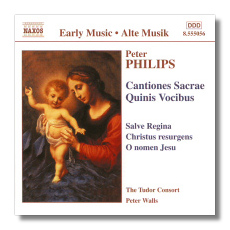
The Internet's Premier Classical Music Source
Related Links
- Philips Reviews
- Latest Reviews
- More Reviews
-
By Composer
-
Collections
DVD & Blu-ray
Books
Concert Reviews
Articles/Interviews
Software
Audio
Search Amazon
Recommended Links
Site News
 CD Review
CD Review
Peter Philips

Cantiones Sacrae, Quinis Vocibus
- Salve regina, mater misericordia
- Hodie beata virgo Maria
- Alma redemptoris mater
- Iste est Iohannes
- O nomen Jesu
- Ave Maria gratia plena
- Cantabant sancti
- Stella, quam viderant magi
- Mulieres sedentes
- Surgens Jesus
- Christus resurgens ex mortuis
- Conceptio tua
- Gaude Maria virgo
- Tibi laus, tibi gloria
- Salve salutaris victima
- O Maria mater et Joannes
The Tudor Consort/Peter Walls
Naxos 8.555056 70:12
Although he was born in England in 1561, Peter Philips spent most of his life as a composer and a pedagogue on the European mainland. Like William Byrd, Philips was an English Catholic during a period of persecution. Unlike Byrd, Philips left. Early experiences in Rome acquainted him with the music of Palestrina; he worked directly with Felice Anerio, Palestrina's successor at the Papal Chapel. Later, in the service of an English lord, he traveled through Northern Europe, settling at first in Belgium and finally in the Spanish Netherlands, where he remained until his death in 1628.
Philips wrote a large number of sacred works. These five-part sacred motets were published in 1612 with a dedication to the Virgin Mary. As an exiled Catholic, Philips responded with particular fervor to texts describing the passion and death of Jesus Christ. Compared to Palestrina, he is a more emotional composer, and his writing frequently anticipates that of Giovanni Allegri, who was born more than twenty years later. He sets the Latin texts with unflagging imagination, illuminating them musically whenever the words or their meaning suggest it, but never in a showy or egotistical way.
On this recording, the New Zealand-based Tudor Consort is comprised of five first and second sopranos, four altos and tenors, and five basses, which seems to create about the ideal weight for these motets. The balance among the five parts is good. The ensemble is twenty years old, and has worked extensively in early music. Walls has directed them since 1993. The performances are technically polished yet human, and every note of Philips's polyphony glows with devotion. The recording was made in the Chapel of Erskine College, Island Bay, Wellington, New Zealand, a venue whose atmospheric reverberation doesn't obscure the music. Thematically, the 16 motets that were selected for this CD have been sensibly and satisfyingly arranged to tell the story of Christ, from the Conception of the Virgin Mary to Easter Sunday.
Naxos' booklet contains an informative essay by Walls, and texts and English translations for all of the motets. Collections of Philips's music are few and far between. This one, especially given the price tag, is outstanding. If you enjoy early music, this new CD is a don't-miss proposition. Gorgeous stuff.
Copyright © 2002, Raymond Tuttle




















